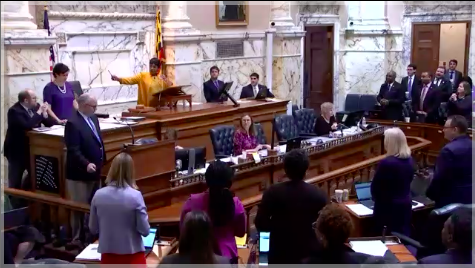Abbreviated Legislative Session Brings Important New Investments in Schools, Communities

Under normal circumstances, yesterday would have been the last day of Maryland’s legislative session. Of course, our current situation is far from normal.
Due to concerns about COVID-19, the legislature adjourned several weeks early, on March 18 – the first time it has done so since the Civil War. Even with the abbreviated time frame, legislators moved more than 650 bills, advancing major reforms to our education system, passing emergency legislation to respond to the pandemic and related recession, and taking steps to create a 21st century tax code that provides additional support for public services.
As bills head to Governor Larry Hogan for his consideration, here’s a look back at what passed, and what didn’t make it through, this year’s Maryland General Assembly session.
Improving Equity in our Education System
One of the most important policy proposals under consideration this legislative session was the Blueprint for Maryland’s Future, which will bring significant new funding to schools across the state and make policy changes that will particularly benefit students experiencing poverty, students with disabilities, and English language learners. An innovative provision to fund additional supports in schools that serve students in the highest-poverty neighborhoods is an important first step to improve educational opportunities for children forced by racially discriminatory policies to grow up in under-resourced neighborhoods. As in the last recession, maintaining Maryland’s commitment to world-class schools and providing a great education to every student is more important than ever.
Legislators also made a significant new investment in school facilities across the state and approved an essential and long overdue increase in funding for the state’s historically Black colleges and universities (HBCUs).
Responding to the COVID-19 Pandemic
While much was still uncertain at the time the legislature adjourned, policymakers did pass emergency bills that expanded access to health care and unemployment insurance, provided additional job protections for those affected by the pandemic, and set aside funds for the governor to respond to the growing public health emergency.
Learn more about the state and federal response to the pandemic so far, and what additional steps they can take.
Updating Our Tax Code
This year the legislature took a couple of small steps to update our tax system to reflect our modern economy, but left bigger reforms on the table. It is more important than ever that we address the flaws in our tax system so we have the resources to address the needs of Maryland families during this crisis, without cutting back on investments in good schools, effective transportation networks, and other public services that are the foundation of our economy – as well as the hundreds of thousands of family-supporting jobs those services make possible.
Expanding Access to Affordable Housing
Maryland legislators took one very important step to address Maryland’s housing crisis this legislative session. After decades of trying, Maryland finally passed the HOME Act, barring discrimination against renters based on their source of income. The bill adds source of income protections to the current list of prohibited forms of housing discrimination and will ban landlords from not accepting Housing Choice Vouchers. Maryland now joins 15 other states plus the District of Columbia with effectively banning this type of discrimination against renters. Other significant reforms to housing were under consideration, but with the legislature adjourning early due to COVID-19, they did not pass.
Learn more about what happened with housing policy this year and what remains to be addressed.
Increasing Economic Security
With the main focus for much of the legislative session on making significant new investments in Maryland’s education system, policymakers had limited resources to expand economic security programs. In addition to emergency legislation to expand eligibility for unemployment, legislators also made a significant policy change to the state’s Temporary Cash Assistance program that will ensure low-income families don’t lose vital support as the result of minor paperwork issues – increasing financial security for children.
Legislators also had robust discussions about creating a public insurance pool for paid family and medical leave, but the bill did not advance in the midst of a shorter session and growing economic and public health crisis.
Balancing State Budget Powers
Maryland’s governor has greater power over the state budget than in virtually any other state. After considering it for many years, legislators finally approved placing a constitutional amendment on the ballot that would create a better balance of power between the governor and the legislature.
The proposed amendment will allow the legislature to increase spending for line items in the governor’s proposed budget and create new items – while still passing a balanced budget. The governor would gain the ability to veto line items in the budget, and the legislature would have the ability to override vetoed line items. This amendment will now be on this fall’s ballot for voters to weigh in.
